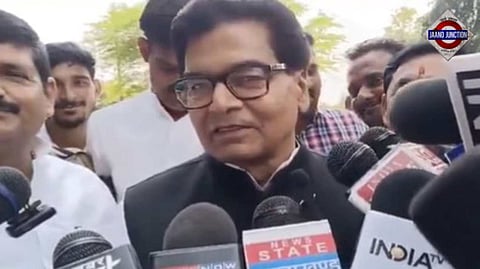

Samajwadi Party MP Ram Gopal Yadav on Monday triggered a massive controversy when he abused Chief Justice of India (CJI) DY Chandrachud on camera when he was asked about the latter's 'prayed to God' remark made in reference to the Ayodhya dispute. However, after facing backlash, Yadav backtracked, claiming that nobody had asked him anything about the Chief Justice.
"I do not want to make any comments. When you bring ghosts back to life, when you bring the dead back to life, they become ghosts and start following justice. Where are they now?... Forget it, all such ******* people keep on saying such things. Should I take notice of them?" Ram Gopal Yadav told reporters.
Later, when asked for a clarification of his objectionable remark, Ram Gopal Yadav denied making such a statement and argued that he was asked to respond to the Bahraich violence.
"Nobody asked me anything about the CJI. The CJI is a very reputed person. I never made any comment (on him). I was asked about Bahraich (violence) and I responded to that," he told news agency ANI.
Reacting to the controversy, Akhilesh Yadav said he was not aware of the objectional remark made by his uncle. "We all respect the CJI," he said.
Earlier on Sunday, Chief Justice Chandrachud said he had prayed for a solution to the Ram Janmabhoomi-Babri Masjid dispute before pronouncing the verdict, emphasising that God will find a way for those who have faith.
Reflecting on his time deliberating on the Ayodhya case, CJI Chandrachud said, "Very often we have cases (to adjudicate), but we don't arrive at a solution. Something similar happened during the Ayodhya (Ram Janmabhoomi-Babri Masjid dispute) which was in front of me for three months."
"I sat before the deity and told him he needed to find a solution. Believe me, if you have faith, God will always find a way," he added.
The Ram Janmabhoomi-Babri Masjid dispute was a long-standing legal and political issue over whether the 16th-century Mughal mosque was built after demolishing a temple on the site, which is claimed to be the birthplace of Lord Ram.
On November 9, 2019, a five-judge Supreme Court bench, led by then Chief Justice Ranjan Gogoi and including Justice Chandrachud, allowed the construction of a Ram temple in Ayodhya while designating an alternative five-acre plot for the mosque, bringing an end to the nearly 70-year-old conflict.
